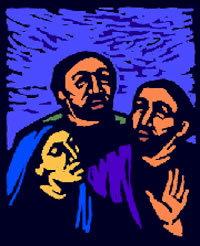
The Feast of Ascension Year A
What does the Church celebrate on Ascension Day? We are being invited to have faith in an important aspect of the Risen Lord’s Paschal Mystery. The Saviour was present to his chosen disciples after the Resurrection, laying the foundations of the Church’s faith. That extraordinary presence was of limited duration, and soon gave way to another manner of presence - as the Saviour guides the Church through the blessings of his own Spirit. Today’s liturgy gathers three passages of the New Testament that give expression to the faith of the first Christians in this phase of the Paschal Mystery.
The concluding passage of Matthew’s gospel is deceptive in its brevity. It is in fact a masterly summary of the teaching of the whole gospel - as the Risen Lord himself sends his disciples on mission with words of encouragement. He gives expression to the fullness of the divine authority that ‘has been given to him’ by the Father. He sends them on a mission that is universal: ‘Make disciples of all the nations’. They are to teach them to ‘observe all his commandments’ - the New Law of his Sermon the Mount. They are to carry out their mission by preaching the Good News and by baptising ‘in the name of the Father and of the Son and of the Holy Spirit’. And, as he echoes the words of the covenant that was the foundation of Israel’s faith - ‘I am with you’ - he assures them that he is truly Emmanuel.
Luke’s account, in the opening passage of the Acts of the Apostles, is the work of a skilful teacher - concerned to help his readers understand the mystery of the Lord’s new manner of presence. Luke alone in the New Testament speaks of the Lord’s dealing with his disciples as lasting ‘forty days’ - a round number frequently used in the scriptures; though it may be linked with the fifty days between Passover and the Pentecost celebration of old Israel. It is made clear that this period is a time of preparation and anticipation - the disciples can look forward to ‘what the Father promised’; not many days hence they ‘will be baptised with the Holy Spirit’. Luke’s account is centred in Jerusalem. (In fact he has omitted any reference to the disciples’ withdrawal in discouragement to Galilee.) Though the divine plan that shaped the Old Testament is being fulfilled, a new era is beginning - shaped, not by false messianic hopes of ‘the restoration of the kingdom of Israel’, but by the Father’s mysterious authority. It is the era of the Church’s earthly pilgrimage. The Acts of the Apostles (like a second volume of Luke’s gospel) will present the Church as carrying out its mission through the blessings of the Holy Spirit - ‘You will be my witnesses to the ends of the earth’. Luke, the careful teacher, sketches a graphic word picture for his readers: the Lord is ‘lifted up’, and a ‘cloud’ (Old Testament sign of God’s presence) takes him from their sight. Perhaps the mystery of the Saviour’s heavenly exaltation (see the early hymn of Philippians 2) has given rise to this kind of description in some circles. But Luke subtly modifies the crudeness of such a presentation. The two heavenly messengers make it clear that what is taking place is not an event of this world. Their advice to the disciples is not to stare into the sky, but to give themselves to the Church’s earthly mission until the Lord returns.
The reading from Ephesians is an eloquent testimony to the way in which the Church understood this mission, carried out under the authority of the Risen Christ, who has made himself ‘the head of the Church which is his body’.
John Thornhill sm

